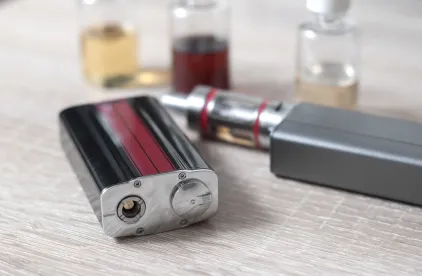Massachusetts has taken a drastic and abrupt step by banning the sale of all vaping products, nicotine and THC, within its state borders for the next four months. This drastic and sweeping prohibition against vaping products will have far-reaching economic consequences for many small businesses that make up the bulk of this new and burgeoning industry. The root cause of the recent vaping-related illnesses appears to be the result of illicit and unregulated THC cartridges from the black market.
Reports and Causes
Dr. Michael Siegal, a professor at Boston University’s School of Public Health, recently stated: “Given the fact that close to 90% of the cases and 100% of the deaths for which products have been reported are associated with marijuana vaping, it is inexcusable that the CDC [Centers for Disease Control and Prevention] fails to distinguish between the products being vaped.” The communications from CDC also have failed to distinguish between vaping oil-based e-liquids − which were used in the illicit THC cartridges that have given rise to multiple arrests in Arizona and Wisconsin and cause lipoid pneumonia − and the water/alcohol-based e-liquids that are used in virtually all e-cigarettes. More troubling is the fact that the media largely has overlooked that the manufacturers of nicotine-containing e-liquids filed their ingredient lists with the FDA years ago.
On September 27, 2019, the CDC released the following information:
- There are 805 lung injury cases reported from 46 states and 1 U.S. territory. Twelve deaths have been confirmed in 10 states.
- CDC has received sex and age data on 771 patients.
- About 69% of patients are male.
- Nearly two thirds (62%) of patients are 18 to 34 years old; with 22% of patients between 18 and 21.
- Sixteen percent of patients are under 18 years of age.
- All reported patients have a history of e-cigarette product use or vaping.
- The latest findings from the investigation into lung injuries associated with e-cigarette use or vaping suggest products containing THC play a role in the outbreak.
- CDC has received data on substances used in e-cigarettes or vaping products in the 30 days prior to symptom onset among 514 patients:
- About 77% reported using THC-containing products; 36% reported exclusive use of THC-containing products.
- About 57% reported using nicotine-containing products; 16% reported exclusive use of nicotine-containing products.
- CDC has received data on substances used in e-cigarettes or vaping products in the 30 days prior to symptom onset among 514 patients:
While some policy makers appear to be confused over the cause of the recent reports of lung disease, there is no coincidence that the recent use of vitamin E acetate and possibly other unapproved thickening agents by the illicit THC manufacturers caused the public health crisis that prompted Massachusetts’s ban of all vapor products. One should ask whether it makes sense that vaping nicotine e-liquids, which have been available since at least 2007, would suddenly cause lipoid pneumonia lung disease (which is a rare condition that occurs when fat particles enter the lung) disproportionately in white males with an average age of 19.
Impact of the Ban
The abrupt action of Massachusetts resembles the witch hunts of that former colony’s past. With a single stroke of a pen on an emergency order from Governor Charlie Baker, Massachusetts has foreclosed the right of its citizens to their freedom of choice, denying them the right to an arguably safer alternative to smoking cigarettes, and caused far-reaching economic harm to many small businesses that manufacture and sell vaping products. Such an action will surely cause many bankruptcies, as these legal businesses can no longer afford to pay rent or buy products made and/or sold by other U.S. companies, pay salaries to employees, or pay taxes to Massachusetts and the federal government.
The economic impact of the vaping industry in the United States in 2018 was almost $24 billion, which means that the impromptu actions of Massachusetts will likely cause a reversing trend and cast a negative shadow over a legitimate and safe industry. The broad scope of the ban smacks of an unconstitutional taking of property without due process. Many affected businesses will have difficulty surviving without four months of revenue, which is why national trade organizations such as The Vapor Technology Association and others are considering legal options.
Call for International Forum on Safety and Health Benefits
Unfortunately, as the witch hunts continue, consumers will not be safer. Any person who was vaping legal nicotine containing e-liquids rather than smoking combustible cigarettes will have to make the choice to return to smoking combustible cigarettes or buy a black market e-liquid product. Citizens of Massachusetts who legally use THC through vaping for medicinal purposes also will be affected by the ban. Since all the data shows the lung disease breakouts were overwhelmingly caused by illicit THC cartridges made with vitamin E acetate or other unregulated thickening agents, the public health ban on legitimate products only increases the black market demand and the risk of illicit THC cartridges finding their way back into the hands of consumers, in addition to creating a black market for nicotine e-liquids while the CDC warns consumers not to buy these products off the street
The manufacturers of both nicotine-containing e-liquids and THC-containing products support meaningful regulation so health problems caused by illicit manufacturers can be prevented. A sensible public health strategy devised by the federal government likely could have prevented many of these illnesses and deaths by stopping unregulated illicit-market THC vape products from getting into the hands of consumers. But the voices of science and good public policy are falling on deaf ears while legitimate small businesses are being harmed and consumer choices for legitimate products are being eliminated.
One can only hope that Massachusetts reconsiders this ban and that other states do not follow this type of overreaching prohibition. Public policy regulators should discuss these issues in an international forum such as The E-Cigarette Summit, where the public health benefits experienced by the UK and other countries as well as the detailed facts of the recent cases of lung disease can be debated before businesses are closed. Until then, the black market profits while legal small businesses are “vaporized.”



 />i
/>i

